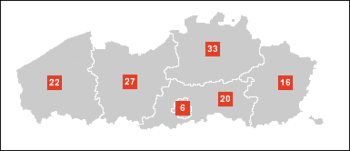Belgian regional elections, 2019
The 2019 Belgian regional elections will take place on Sunday 26 May, the same day as the 2019 European Parliament election[1] as well as the Belgian federal election unless snap federal elections are called.
In the regional elections, new representatives will be chosen for the Flemish Parliament, Walloon Parliament, Brussels Parliament and the Parliament of the German-speaking Community. The Parliament of the French Community will be composed of all elected members of the Walloon Parliament (except German-speaking members) and 19 of the French-speaking members of the Brussels Parliament.
The elections will follow the 2014 elections and will be shortly after the 2018 local elections, which will be indicating voters' tendencies after an unusually long period of time without any elections in Belgium.
Electoral system
The regional parliaments have limited power over their own election; federal law largely regulates this and the federal government organises the elections, which occur per Article 117 of the Constitution on the same day as the European Parliament elections.
As such, all regional parliaments are elected using proportional representation under the D'Hondt method. Only Belgian citizens in Belgium have the right to vote, and voting is mandatory for them.
Flemish Parliament
|
| |||
| |||
All 124 seats in the Flemish Parliament 63 seats needed for a majority | |||
|---|---|---|---|
|
| |||
| |||

All 124 members of the Flemish Parliament will be elected. The five Flemish provinces (West Flanders, East Flanders, Antwerp, Flemish Brabant and Limburg) each are a constituency, plus the Brussels-Capital Region where those voting for a Dutch-language party can also vote in the Flemish election.
The incumbent Bourgeois Government is made up of a coalition of Flemish nationalists (N-VA), Christian democrats (CD&V) and liberals (Open Vld). The incumbent Minister-President is Geert Bourgeois (N-VA).
| Political party | Party leader | 2014 seats | Current seats | |
|---|---|---|---|---|
| New Flemish Alliance (N-VA) | Bart De Wever (since 2004) | 43 (government) | 42 (government) | |
| Christian Democratic and Flemish (CD&V) | Wouter Beke (since 2010) | 27 (government) | 27 (government) | |
| Open Flemish Liberals and Democrats (Open Vld) | Gwendolyn Rutten (since 2012) | 19 (government) | 19 (government) | |
| Socialist Party Different (sp.a) | John Crombez (since 2015) | 18 (opposition) | 18 (opposition) | |
| Green (Groen) | Meyrem Almaci (since 2014) | 10 (opposition) | 9 (opposition) | |
| Flemish Interest (Vlaams Belang) | Tom Van Grieken (since 2014) | 6 (opposition) | 6 (opposition) | |
| Union des Francophones (UF) | 1 (opposition) | 1 (opposition) | ||
| Independents | N/A | 2 (opposition) | ||
Walloon Parliament
All 75 members of the Walloon Parliament will be elected. The members are elected in multi-member arrondissement-based constituencies; the Walloon Parliament is the only parliament in Belgium still using this geographical level for constituencies. A January 2018 law however reduced the constituencies from 13 to 11, following a successful challenge by Ecolo to the Constitutional Court that constituencies with too few seats are unrepresentative. Both Luxembourg constituencies were merged and the Hainaut constituencies were redrawn.
After the 2014 elections, a government was formed with a coalition of the Socialist Party (PS) and Christian democrats (cdH). In 2017 however, following major scandals involving mainly PS, cdH opted to continue governing with MR as main party instead of PS. Willy Borsus (MR) succeeded Paul Magnette (PS) as Minister-President of Wallonia in July 2017. This is the first time a government majority changed during a legislative term of a Belgian regional government.[2]
| Political party | Party leader | 2014 seats | Current seats | |
|---|---|---|---|---|
| Socialist Party (PS) | Elio Di Rupo (since 1999) | 30 (government) | 30 (opposition) | |
| Reformist Movement (MR) | Olivier Chastel (since 2014) | 25 (opposition) | 25 (government) | |
| Humanist Democratic Centre (cdH) | Benoît Lutgen (since 2011) | 13 (government) | 13 (government) | |
| Ecolo (Ecolo) | Zakia Khattabi & Patrick Dupriez (since 2015) | 4 (opposition) | 4 (opposition) | |
| Workers' Party (PVDA-PTB) | Peter Mertens (since 2008) | 2 (opposition) | 2 (opposition) | |
| People's Party (Parti Populaire) | Mischaël Modrikamen (since 2009) | 1 (opposition) | N/A | |
| Independents | N/A | 1 (opposition) | ||
Brussels Parliament
All 89 members of the Parliament of the Brussels-Capital Region will be elected. They are elected at-large, but there are separate Dutch-language party lists and French-language party lists. Those voting for a Dutch-language party can also cast a vote for the Flemish Parliament election.
German-speaking Community Parliament
All 25 members of the Parliament of the German-speaking Community will be elected in one constituency (at-large).
References
- ↑ Article 117 of the Belgian Constitution
- ↑ "Passation de pouvoir historique entre Paul Magnette et Willy Borsus". RTBF. 29 July 2017.